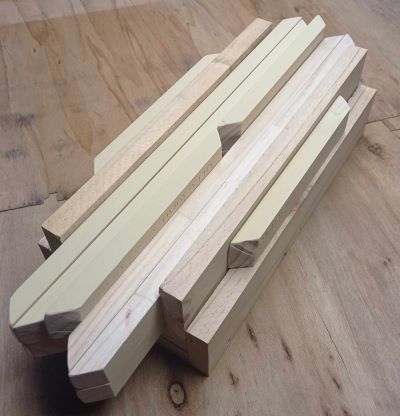Build your own coffin
Any person with reasonably good carpentry skills, a decent set of tools and a large enough working space should be able to make a perfectly good casket from plywood or timber. The word "casket" means any type of receptacle used to contain and transport a dead body - however a casket typically has four sides, while a traditional tapered coffin has six. MDF is a popular choice in the funeral industry due to its smooth surface, but it is very heavy. Plywood is lighter, stronger and usually easier to source - especially if you are going to use recycled pallets. Even though it's fairly simple joinery there is still quite a bit of work to it - however there is no better way to obtain a cheap casket. If you have the skills then watch a few YouTube videos and give it a go.
What standards apply to caskets in New Zealand?
In New Zealand there is no legislation which sets standards for the construction of coffins and caskets. So there is no legal certification process or any requirement for this under NZ law. However local councils, cemeteries and crematoria will have their own rules about what is and isn't alllowed. For example some councils will not allow cardboard coffins to be used; others will. Bear in mind that because crematoria use roller systems, a casket for cremation must always have a flat bottom with no feet or other protrusions. Also if you are planning to arrange a certified "natural" or "eco" burial you will have to use a casket or shroud board which meets their standards, outlined here.
Funeral homes will generally accept a home-made casket or coffin, but they may not allow it to be carried by pallbearers. Instead they will use a gurney or trolley to move it, and they may also charge a handling fee. Using your own casket may not make much difference to the price if you have signed up for a package.
For a slightly dated but still interesting video by a funeral director on things to consider when making your own casket, click here.
Shroud bearers
Shroud bearers (also known as shrouding boards) are gaining in popularity in New Zealand, with many local councils, cemeteries and crematoria now allowing bodies to be buried or cremated on one. A shroud bearer is basically a board with ends, shallow sides and handholds. The body must be completely wrapped in a shroud (a fancy word for a sheet), and must be tied onto the board before it is carried. A shrouding board is probably the cheapest form of casket you can hope to make, although commercially obtained ones still cost a small fortune.
To watch a video of a home funeral which used a shroud bearer, which the family is happy to share publicly, please click here.
The "DIY kit" - an easy way to build your own casket
This DIY kit will let you build your own rectangular casket out of plywood which you can get cut at any large hardware store. If you are keen to use recycled materials I can provide plans which show you how to make a casket using one standard sheet of plywood and a plywood pallet for the base; however most people will probably prefer to get the plywood cut to size.
The kit contains contains all the corners, battens and fixings you will need to assemble your casket, but you will need to provide your own PVA. The following are provided electronically, or hard copies can be included with the kit:
- Detailed drawings and cutting plans for either a small, standard or large casket depending on which size of kit you buy.
- Assembly instructions with photos.

Price $150 for one kit or $250 for two, plus freight cost. If you are planning ahead, or are part of a group who are considering making their own caskets, it actually makes sense to built two at once. This is because it takes two sheets of plywood to build one casket with quite a lot of waste, while two kits can be cut from three sheets of plywood. This reduces the waste and therefore materials cost.
To build this kit you will need to be able to follow plans and instructions, and have decent tools and a roomy workspace. If you do buy a DIY kit from me you can contact me at any time for advice on its construction.
To order please call or text Frances on 022 561 5620 or email info@diyfuneral.co.nz.
